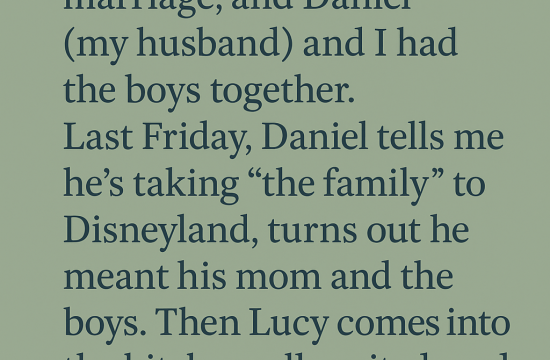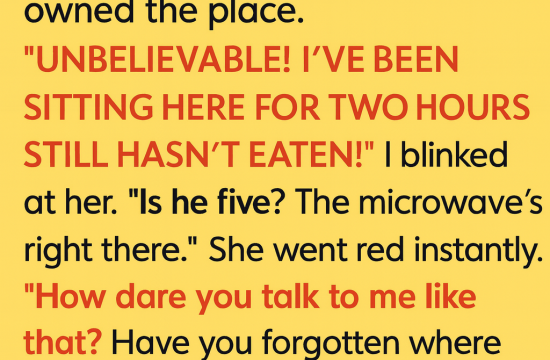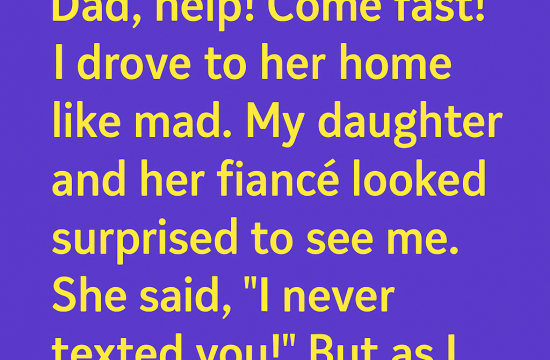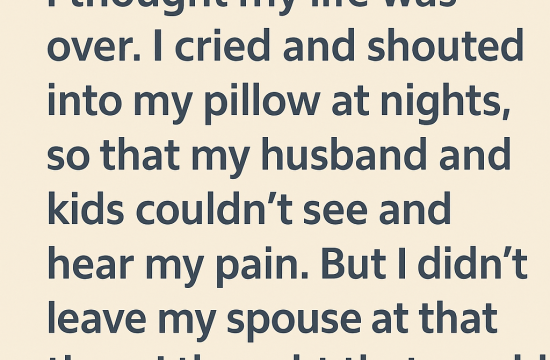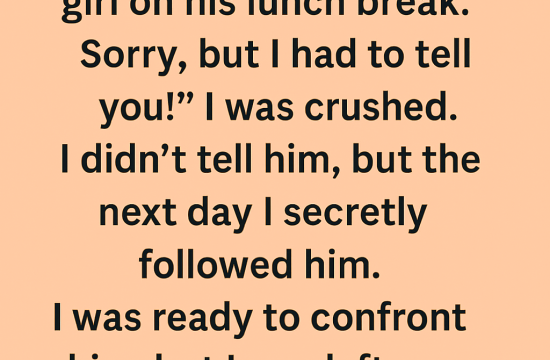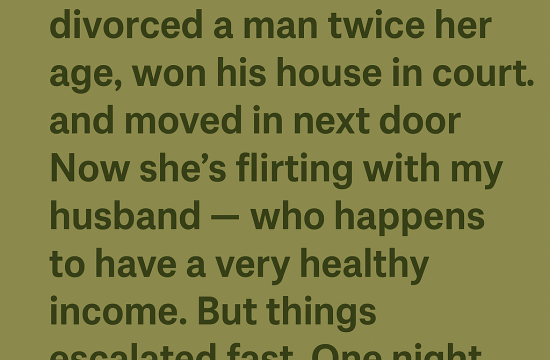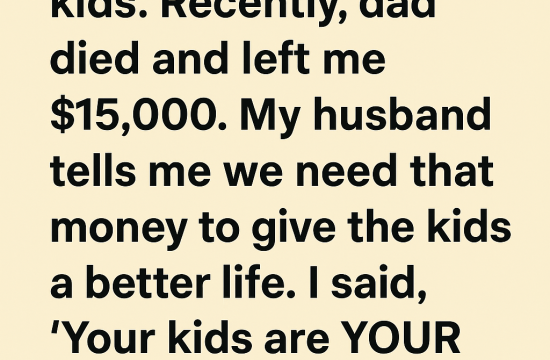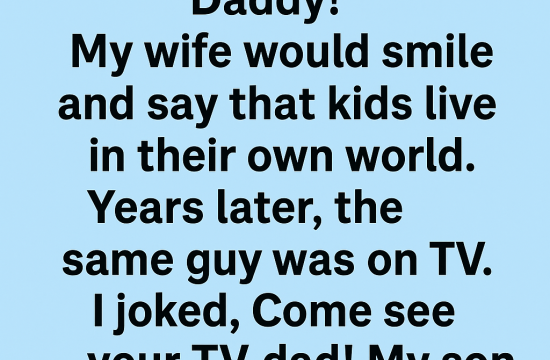As a 33-year-old lawyer specializing in infidelity cases, I made a living out of finding the truth that couples tried to hide—and then turning that truth into the best possible deal for the aggrieved party. My work taught me to value trust in marriage more than anything. So when I married Natalie, a devoted schoolteacher with a warm laugh and an ironclad punctuality, I believed I had found something real.
One evening I pulled into our driveway at sunset and frowned at the empty spot where Natalie’s car should have been. Lately she’d been home later than usual. The house felt too quiet; my profession made me superstitious about silence. An unwelcome thought crawled into my head: could Natalie be lying to me?
When she finally arrived, exhausted, I couldn’t hold my tongue. “Where have you been? You’ve been late a lot,” I said before I could think. “Is there something you’re not telling me? Are you… cheating?”
She looked genuinely shocked. “Hank, I love you. I could never cheat on you. I’ve just been grading tests,” she said, and for a moment her explanation fit her—she loved her students, she always stayed late sometimes. I nodded and tried to let it go.
But as we ate, a message popped on her phone: “Honey, will you be there tomorrow?” She deleted it quickly and kept talking, but the intimacy of the words lodged under my skin. When I asked about it, she insisted it was a wrong number. I tried to trust her. The next night, though, the message invaded every quiet moment. In bed I pretended to sleep while suspicion and curiosity kept me awake.
It was wrong, but I used her finger to unlock her phone. There was a contact called “Rabbit,” conversations about meeting up, dates that matched the nights she’d come home late. I checked bank statements next—old habits die hard. Charges for toys, hospital bills, deposits to a different account—evidence that suggested a child and medical expenses. My chest tightened. Did she have a child I didn’t know about? Who was the father?
At dawn I followed her. She left the school and drove to a run-down house in a modest neighborhood. I watched from my car until she walked inside. Through a window I saw a man and a small girl in a wheelchair. Natalie sat close to them, their familiarity obvious; she kissed the man on the cheek. The sight sliced me in half.
A dog barked and gave me away. Natalie looked out, panicked, then called for the police. I scrambled over a fence, ripping my pants, and fled—the ridiculous image of myself slipping through a neighbor’s hedge flashing across my mind. Back in my car, the picture of Natalie with the child haunted me. I wanted answers, not explanations.
That evening I confronted her. She was furious—”You went into my phone?” she demanded. I told her everything I’d seen. “You followed me?” she repeated, incredulous. She stormed to our bedroom, packed a bag and declared she was leaving. She told me the man and child were her brother and niece; she refused to answer why I’d never met them.
When she slammed the door, something in me snapped. I ransacked the bedroom and found, hidden in a false compartment in her wardrobe, a gun, several counterfeit passports, a bag of cash, and a yellowed newspaper clipping about a notorious bank robbery. My stomach dropped. I wrapped the evidence in a shirt, put it in my trunk, and drove to a nearby hotel where I’d seen her go that afternoon.
I bribed the receptionist for a room number and knocked on her door pretending to be room service. She opened, arms crossed. The air between us felt colder than any courtroom I’d ever been in. I laid the bag on the bed and demanded answers. She sighed and told me a story that didn’t fit the neat boxes of my cases: her niece needed urgent surgery, they had no money, and the people she had once trusted had pulled her into one desperate crime to pay for it. She admitted involvement in the robbery and said she’d been running ever since.
My training as a lawyer kicked in at first—there were ways to handle this, strategies, pleas, bargains. “We have to tell the police, Nat,” I said. “But Luke—Luke’s the best criminal defense attorney I know. He could help us. You can’t keep living like this.”
She looked at me like I was naïve and terrified. For the first time I saw how worn down she was; fear had been her constant companion. She nodded, or maybe she merely let me believe she had. We drove home together that night.
At the kitchen table, over tea, the adrenaline that had driven me through the day ebbed away. I remember Natalie’s hand guiding me toward the bedroom. The next thing I knew, I woke up disoriented with a metallic taste in my mouth and a knife beside me stained dark.
Panic flooded me. The house was trashed—furniture overturned, ornaments smashed—and there were bloodied sheets. A trail of blood led away from the bedroom. Adrenaline clawed through my veins. I saw figures outside; neighbors and two policemen were talking, someone mentioning a scream. I had no memory of leaving the house, yet my car looked like it had been driven through a field.
Fear made me irrational. I grabbed Natalie’s pistol from the drawer in a blind, guilty panic, and climbed out the window. I thought—terribly, stupidly—that I could find Natalie, force her to tell the truth, and fix everything before anyone else could be harmed. I hid, watched cops scatter, and used the tracking app I had installed earlier to find her. The app led me to an empty stretch of road and a discarded phone in the grass.
I hopped a taxi to her brother Tom’s house and, in a cold, decisive moment, pulled a gun and forced my way inside. I held it on them and demanded Natalie come to the phone. When she answered, I told her—angry, raw—that if she didn’t come within six hours I would kill Tom and the child. It was monstrous. It was beyond anything I would ever advise a client to do. But obsession had drowned reason.
Tom and Katie sat frozen on the couch; the gun felt like an extension of my panic. When Natalie finally arrived, she hung back in the doorway, hands trembling. I could see the shock in her eyes. The words tumbled out of me—accusation, betrayal, a plea to understand why she had lied about everything. She begged me to release them. “Hank, please,” she whispered.
The sirens arrived in time. Officers rushed in and disarmed me. I remember the weight of handcuffs around my wrists and the bright, accusing lights on the living room ceiling. Natalie’s shoulders sagged and she told the truth again—about the robbery, the payments, the fake documents—everything that had driven her to live a double life. They read us our rights. Both of us were led away.
Sitting in the back of the patrol car, handcuffs biting, the irony hit me: I had spent my career exposing lies and protecting the hurt; now I was the perpetrator of a terrifying, reckless crime. The arresting officer’s words stayed with me: “No goal justifies threatening someone with a gun. You should’ve called us and let us handle it.”
In the holding cell I had time—too much time—to think. There were a thousand ways this could have gone differently. I could have trusted her account of tired nights at school. I could have knocked on Tom’s door and asked, or simply called a cop instead of taking the law into my own hands. Instead, I’d let suspicion and professional arrogance make me judge, jury, and executioner.
I called Luke as soon as I had access to a phone. Once the initial legal fog lifted, I resolved to tell the whole story, to cooperate, and to accept whatever consequences the law saw fit. I’d abused my profession and my vows; I owed the world and the people I’d endangered a full accounting.
What began as a simple question—was she cheating?—had unspooled into a nightmare none of my briefs could have prepared me for. There was guilt, yes. There was betrayal, yes. But under everything else there was a lesson that had blood on it: evidence lies if you let it, and in private lives the truth is often more complicated, and more humane, than the black-and-white tales we tell in courtrooms.
When the mornings came after and the newspapers recounted our story in half-sentences, I learned that truth is not always vindication. It is, at best, a starting point toward amends. I had to live with that—my clients would face the consequences of my mistake, and so would I. I could only hope Luke could keep me out of the worst of it, and that one day—after fines, hearings, and a long reckoning—trust might be rebuilt, or at least understood.
In the quiet of my cell I thought of Natalie’s tired face, of the small girl in the wheelchair, of the gun hidden in a wardrobe. I thought of the many people whose lives had been upended by desperation. I had always believed the law could fix things. That night I discovered it could also fail spectacularly, especially when you try to make it serve your own fear instead of justice.




